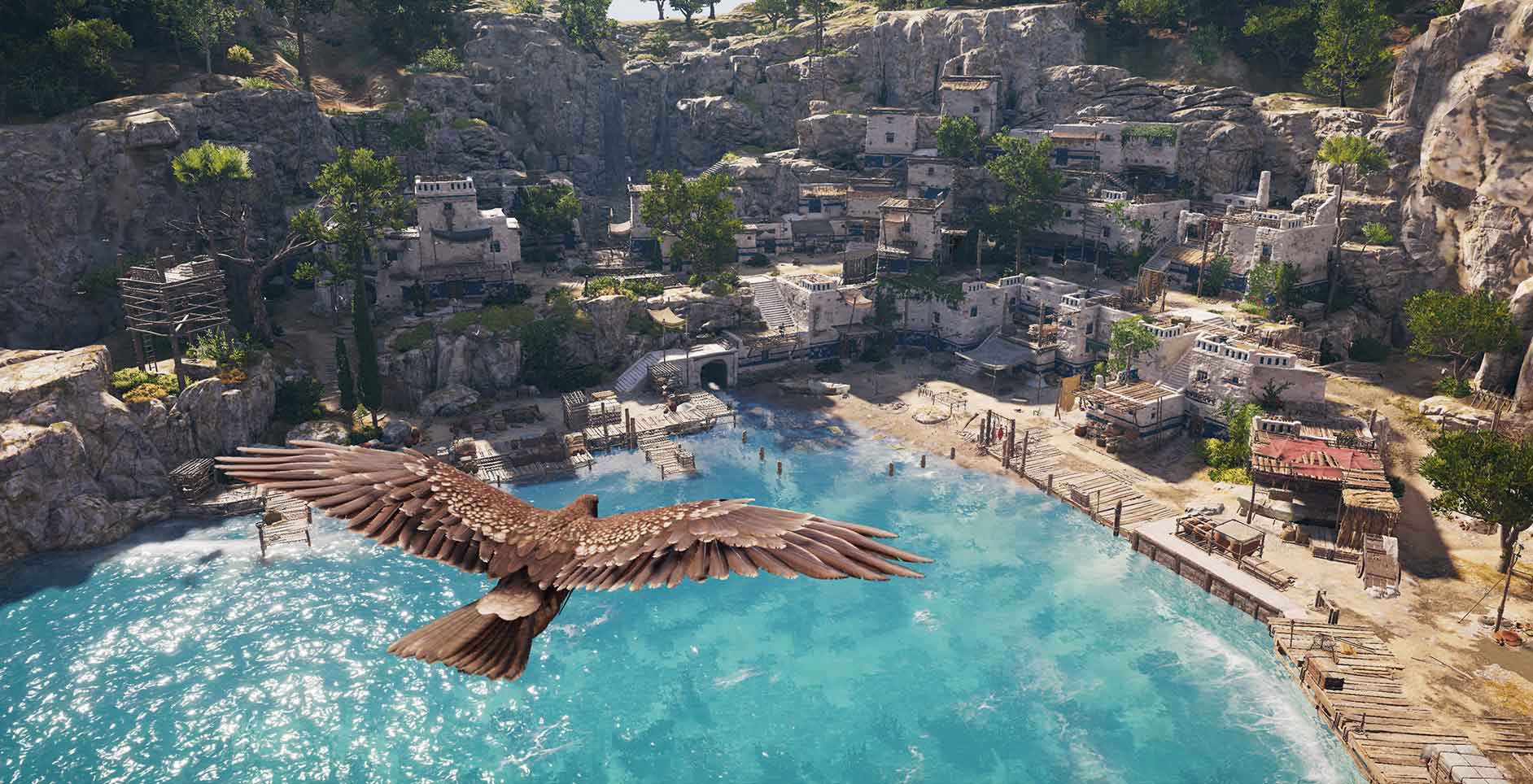Taking players into a place of conflict was an early mission statement of Ubisoft Quebec as they began their journey developing Assassin’s Creed Odyssey. Having enjoyed the game’s company for a handful of hours, I’m comfortable in saying that there’s no better setting the team could have picked. Greece tangled up in the Peloponnesian War, a war that would reshape the world of Ancient Greece forever, was an obvious choice. Some might believe that Odyssey was simply a knee-jerk reaction to Origins’ whirlwind success, however, this Greek tragedy has been in development for over three years and developed largely alongside Ubisoft Montreal’s smash hit from last year.
Not only was conflict a key goal, but contrast played a big part in the planning. Again, Greece suited this ideal to the ground. War and peace wrestle for control while the former consumes the country’s beautiful and picturesque rolling hills and fields. Rational thinking and the devout worshippers who believe firmly in the Gods clash ideals, adding another layer of contrast to a fascinating slice of world history.
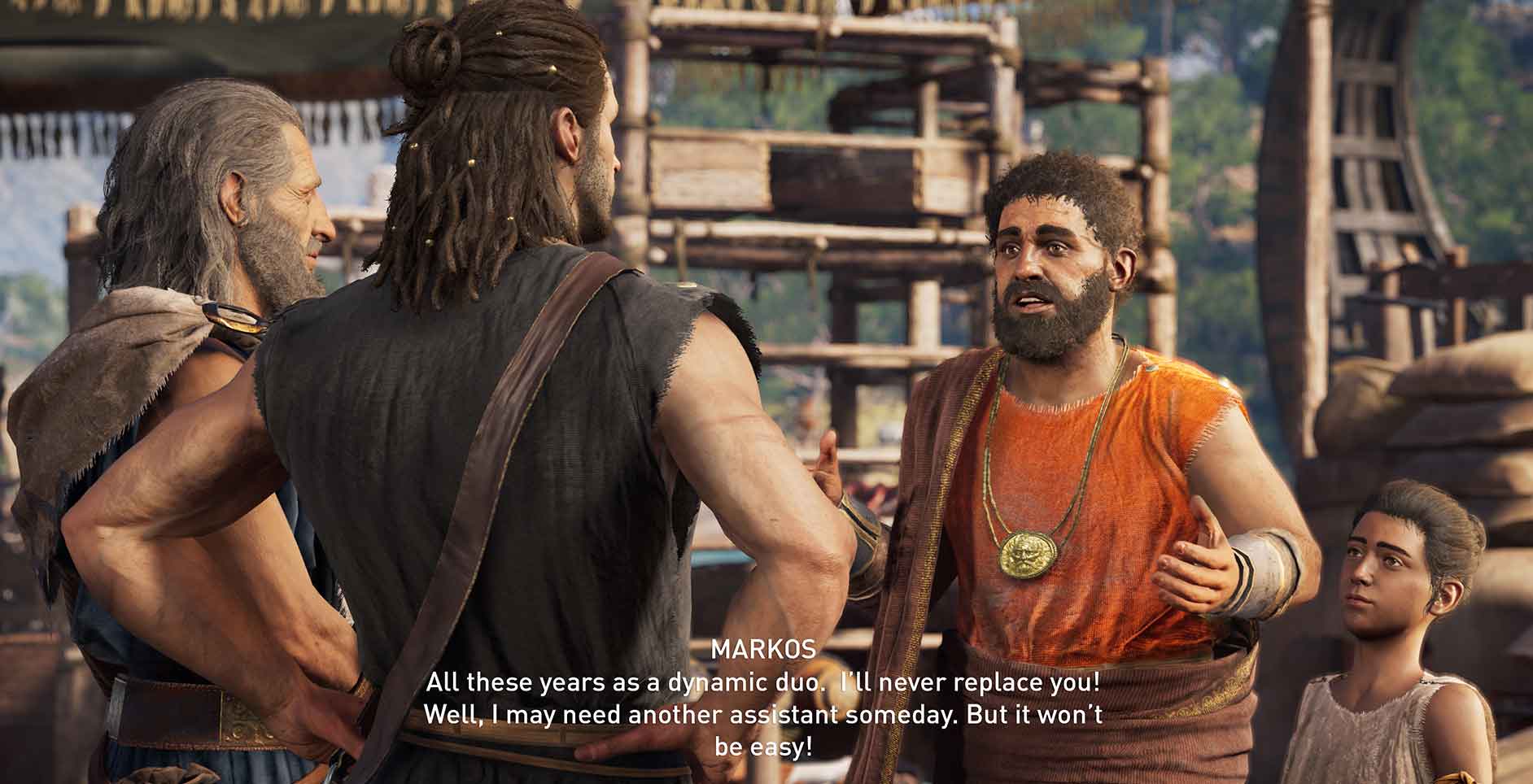
Unlike previous play sessions, such as Toby’s from Gamescom which thrust him into a later slice in the full experience, I was taken back to the very beginning and set loose on an unsuspecting Kephallonia.
I chose Kassandra and the game then treated me to a glimpse into her lineage, featuring a stoic and surprisingly aged, world-weary King Leonidas, of whom Kassandra (Alexios also, if you opt to step into his shoes) is a direct descendant. My perception of the war hero has warped thanks to the washboard abs of Gerard Butler, but the scenes featuring the great king in action against the Persians are brutal. Though we’re not permitted to discuss further elements of Kassandra’s human story, which extends to her direct family, Odyssey sets a dark tone with the introduction of Leonidas and it didn’t decide to waver from it even as my demo neared the five-hour mark.
I’m truly excited to see where they go with Kassandra’s arc, though it’s also made apparent early on in the game that my experience is likely to be vastly different to another’s. In an attempt to move right toward being a fully-fledged role-playing game, Odyssey goes far beyond Origins’ lighter elements and includes dialogue options and branching narrative decisions. Not only does this give the player more agency in how the story unfolds, it adds a lot of replay value which is something these typically linear titles have lacked. The dialogue for both characters is apparently 1:1, though I must admit I did enjoy Kassandra’s sharp tongue, there’s something about her delivery that suggests she’s just had a gutful of everyone’s shit and she doles out constructive criticism on the regular.
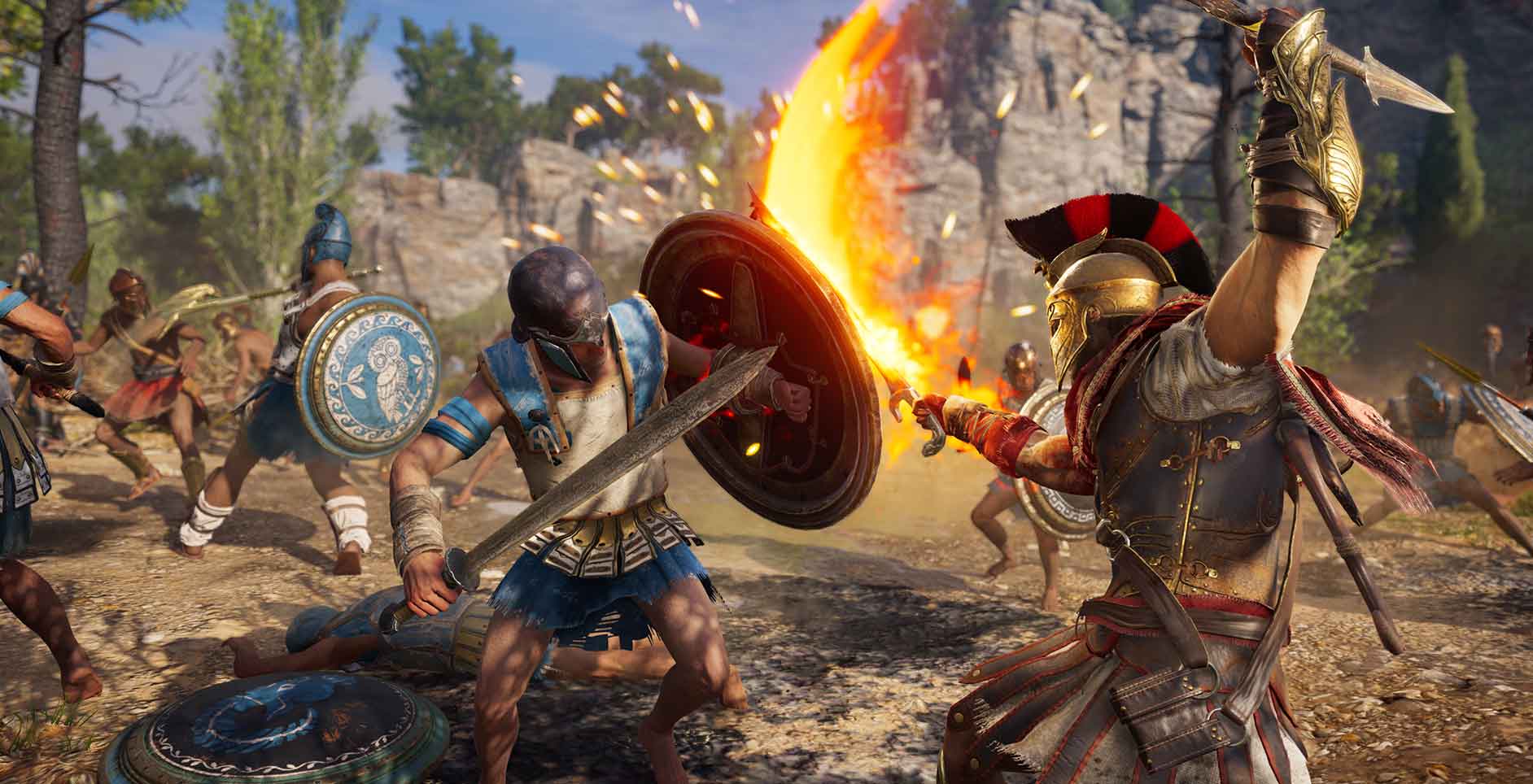
With Kephallonia at my disposal and with a vague goal in mind, I set off immediately in the wrong direction. In the end, this was largely my fault and a rather unfriendly wolf didn’t hesitate to have me for supper. I gathered my bearings and set off for my objective. Rather than pinning a waypoint to your map like in most open-world games, Odyssey gives you just as much information as you need to find where you’re going. While this is a fun change-up, it sort of became busy work and an excuse to use Ikaros, our gift from the Gods eagle drone that makes recon an absolute breeze.
The combat remains largely unchanged from Origins, it’s still brutal and unforgiving with archers forever causing me grief from afar. Without a shield to hold, Kassandra relies on parrying to create breaks in combat and, for the most part, it works. Skill trees return again and, in my experience, half of the skills I unlocked didn’t feel worth the effort. Of course, I’m sure they’ll upgrade and buff over time, but at a base level, there’s no difference between bull-rushing an enemy and just using a heavy-attack. That said, being able to Sparta kick soldiers from battlements is immensely fun and I’ll never tire of it.
Odyssey embraces its role-playing identity by including a number of new systems that help the world evolve and feel truly alive. As you play and do illegal things, your infamy will grow and mercenaries will be sent after you. They remind me a lot of a watered down version of Mordor’s captains as their weaknesses can be discovered and their eventual demise causes a shuffle in the sellsword ranks. It’s a nice inclusion that makes even the simplest fights volatile. I was happily cutting through a bandit camp when two mercenaries descended upon me, it wasn’t my best five minutes fleeing with my tail between my legs. Alongside the addition of hired assassins is the concept of Nation Power. Late in my demo, in an attempt to curry favour with the Sparta hierarchy I agreed to lessen the Athenian stranglehold in Megaris. This is done by overthrowing the leader, sending the region into chaos. You can attempt the hit right away though their house is often heavily fortified, it’s only by killing high-ranked officials like captains and polemarchs, setting their national treasure ablaze and other devastating acts that you can lessen their grip of power, rendering the leader vulnerable. It adds a depth to the war aspect of Odyssey that I’ve seldom seen in games that tackle historical conflicts like this, I expect it’ll be a huge time sink taking the land back.
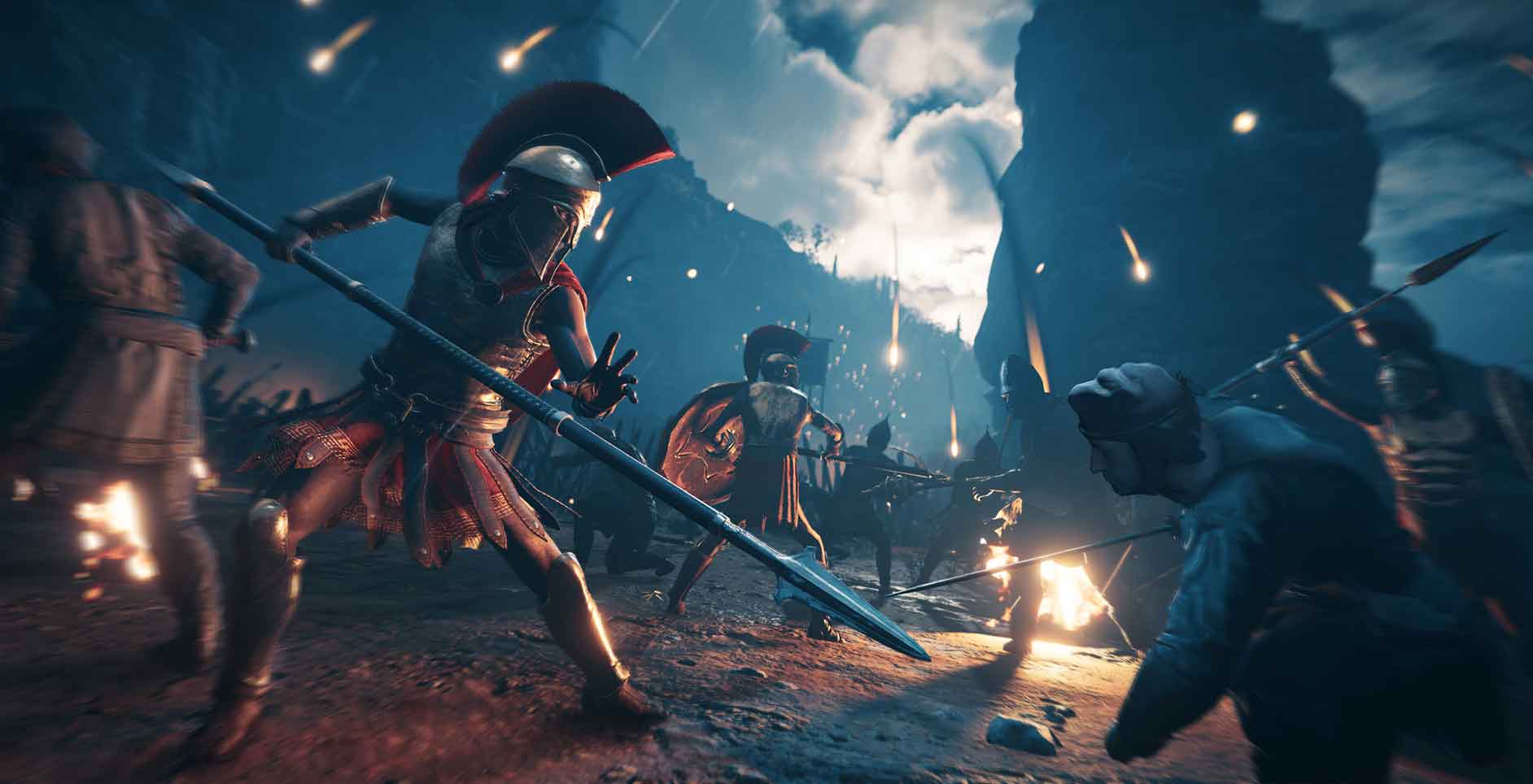
One thing Assassin’s Creed has always managed is writing pretty great supporting characters. Before long I met Markos who is, in all honesty, a slimy, greedy bastard of a man that is more trouble than he’s worth. Unfortunately, Kassandra owes him a debt, so I’m afraid we’re stuck with him. Our first task is to begrudgingly pluck him out of hot water, so as a means of getting about Kassandra insists on taking a steed. I chose Phobos, a mighty beast that no matter where you call it from, even if there’s a sea between you, will come to your beck and call. The mission structure is the same as it ever was, often times requiring you to travel some way before roughing up an unsavoury group of bandits, resolve a genuine dilemma (often with one clear solution unless you’re a monster) or fetch something. The only things that have changed are the faces and the words used to compel us to that end. Fortunately, there’s a lot more to do in Odyssey.
Before going hands-on with Odyssey I would have called naval combat an unwelcome return to the series. I couldn’t stomach it in Black Flag and, though the formula hasn’t changed a great deal, I think it arrives at an ideal time in the game’s rather lengthy introduction. After punching on with Cyclops, who is a man not the literal monster of the mythos, and rescuing a one-eyed ship captain named Barnabas, we team up and hit the high seas. Though the vessel feels glacial slogging through the waves, when it comes time to sink the Athenian fleet blocking the shore, there was a lot of fun to be had. Perhaps naval warfare caught me on a bad day all those years ago, because it’s a most welcome return as nothing beats the feeling of ramming a disabled ship and reducing its parts and people to cinders.
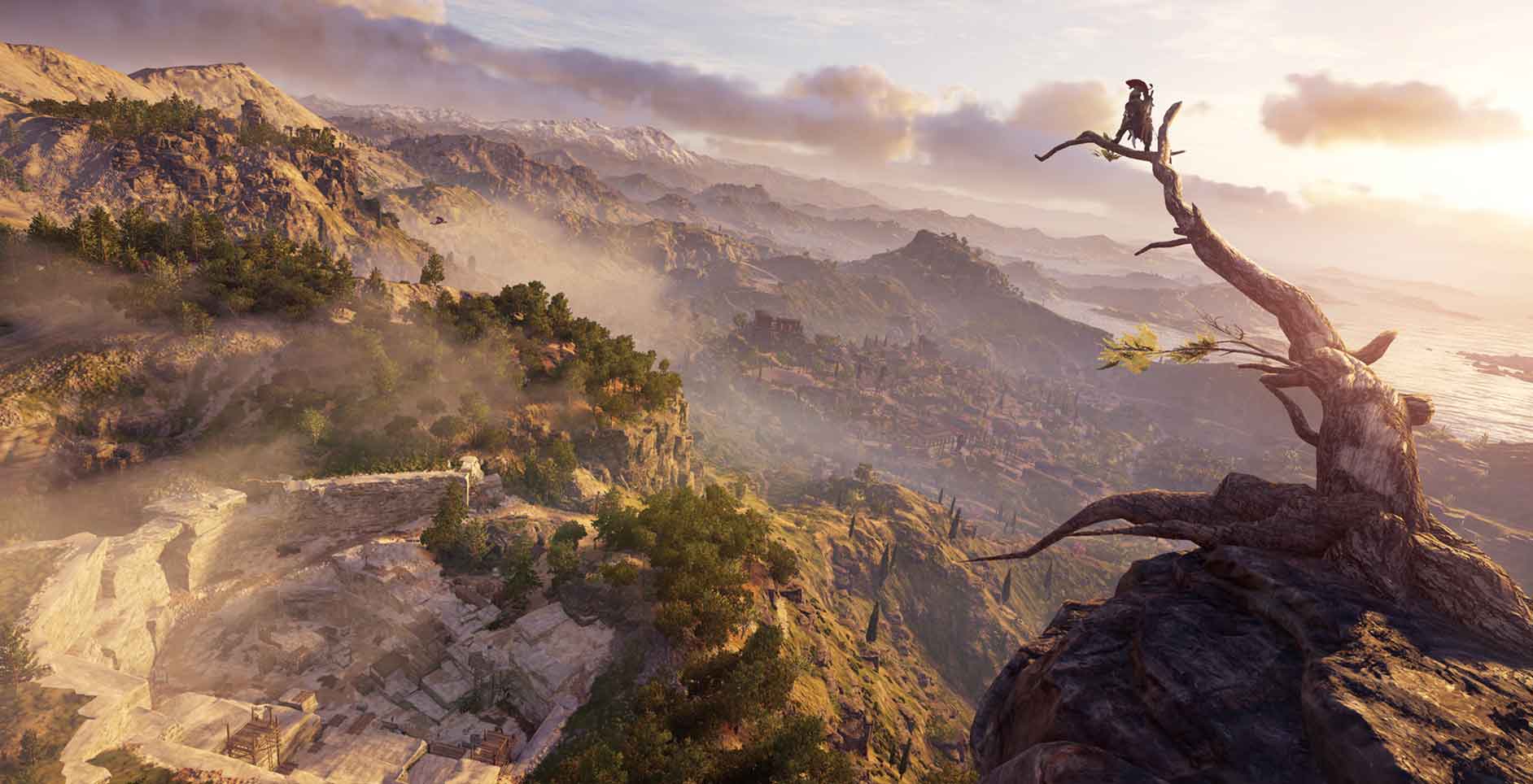
My main concern going into Odyssey is that the world perhaps mightn’t be as enjoyable to wade through as perhaps Origins was. I adored sitting atop my camel as its feet crash down through the blistering sands, it was as beautiful as it felt destructive. Though Greece is obviously a picturesque land adorned with many great monuments to the Gods, the most of it felt a little bland and monotonous to trek across. I hope this isn’t the case for the world at large because, as one other brave journalist discovered, it takes about forty minutes to venture from coast to coast as he spent a chunk of his time heading to the island of Lesbos.
Assassin’s Creed Odyssey feels like a step forward in most facets. Its expanded role-playing mechanics only add depth to an already broad and expansive game, plus it is hard to not get excited for the mythology aspect. Just as God of War did for Norse mythology, I hope Odyssey can do for Greek.


